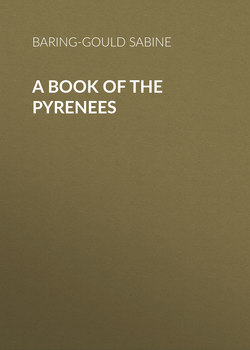A Book of the Pyrenees

Реклама. ООО «ЛитРес», ИНН: 7719571260.
Оглавление
Baring-Gould Sabine. A Book of the Pyrenees
CHAPTER I. THE PYRENEAN
CHAPTER II. GASCONY
CHAPTER III. BAYONNE
CHAPTER IV. S. JEAN-PIED-DE-PORT
CHAPTER V. ORTHEZ
CHAPTER VI. PAU
CHAPTER VII. OLORON
CHAPTER VIII. THE VAL D’OSSAU
CHAPTER IX. LOURDES
CHAPTER X. THE LAVEDAN
CHAPTER XI. LUZ AND CAUTERETS
CHAPTER XII. TARBES
CHAPTER XIII. BAGNÈRES
CHAPTER XIV. THE VAL D’AURE
CHAPTER XV. LUCHON
CHAPTER XVI. COUSERANS
CHAPTER XVII. FOIX
CHAPTER XVIII. LA CERDAGNE
CHAPTER XIX. THE CANIGOU
CHAPTER XX. PERPIGNAN
Отрывок из книги
The Pyrenees stand up as a natural wall of demarcation between two nations, the French and the Spaniards, just as the mountains of Dauphiné sever the French from the Italians. It has been remarked that these natural barriers are thrown up to part Romance-speaking peoples, whereas the mountain ranges sink to comparative insignificance between the French and the Germans. Over the Jura the French tongue has flowed up the Rhone to Sierre, above the Lake of Geneva, so the Spanish or Catalan has overleaped the Pyrenees in Roussillon, and the Basque tongue has those who speak it in both cis-Pyrenean and trans-Pyrenean Navarre. The Pyrenees are the upcurled lips of the huge limestone sea-bed, that at some vastly remote period was snapped from east to west, and through the fissure thus formed the granite was thrust, lifting along with it the sedimentary rocks.
Consequently the Pyrenees consist of from two to three parallel chains. The central and loftiest is that of granite, but where loftiest is hidden on the north side by the upturned reef of limestone. On the south the calcareous bed is lifted in great slabs, but split, and does not form so ragged and so lofty a range.
.....
There are not many megalithic monuments to the north of the chain, but sufficient remain to show us that the dolmen-builder occupied the land from sea to sea. At Buzy, near the entrance to the Val d’Ossau, is a fine dolmen. I saw it first in 1850; it had been recently dug out by a treasure-seeker. A peasant told me that the man who had rifled it had found a bar of gold so soft that he could bend it. In fact, it consisted of pure gold without alloy. Near the dolmen lay a slab of red sandstone, with circles carved on it, some concentric, much like the carvings on the stones of Gavr’innis, in Brittany, and in the great covered way at Drogheda, in Ireland. Not having a drawing book with me nor a scale, all I could do at the time was to sketch the sculpture on my cuff. Three weeks later I revisited Buzy to make a careful drawing to scale of the slab, and found that in the meantime it had been broken up by the road-menders.
The road from Pau to Tarbes traverses a vast plateau, rising 300 feet above the plain of the Adour. It is composed of marshy moorland covered with fern and gorse. This is actually the old moraine deposited by the glacier of Argelez. It is made up of angular blocks brought down from the mountains, excellent material from which to construct mortuary cells. And on this plateau we find tumuli in remarkable abundance. This, as well as Lannemezan, must have served as huge cemeteries. Of late these cairns have been excavated, and prove to cover dolmens and covered avenues; one, the Grande Butte of the lande of Pontacq, contains a megalithic chamber, recalling the finest monuments of the kind in Brittany.
.....